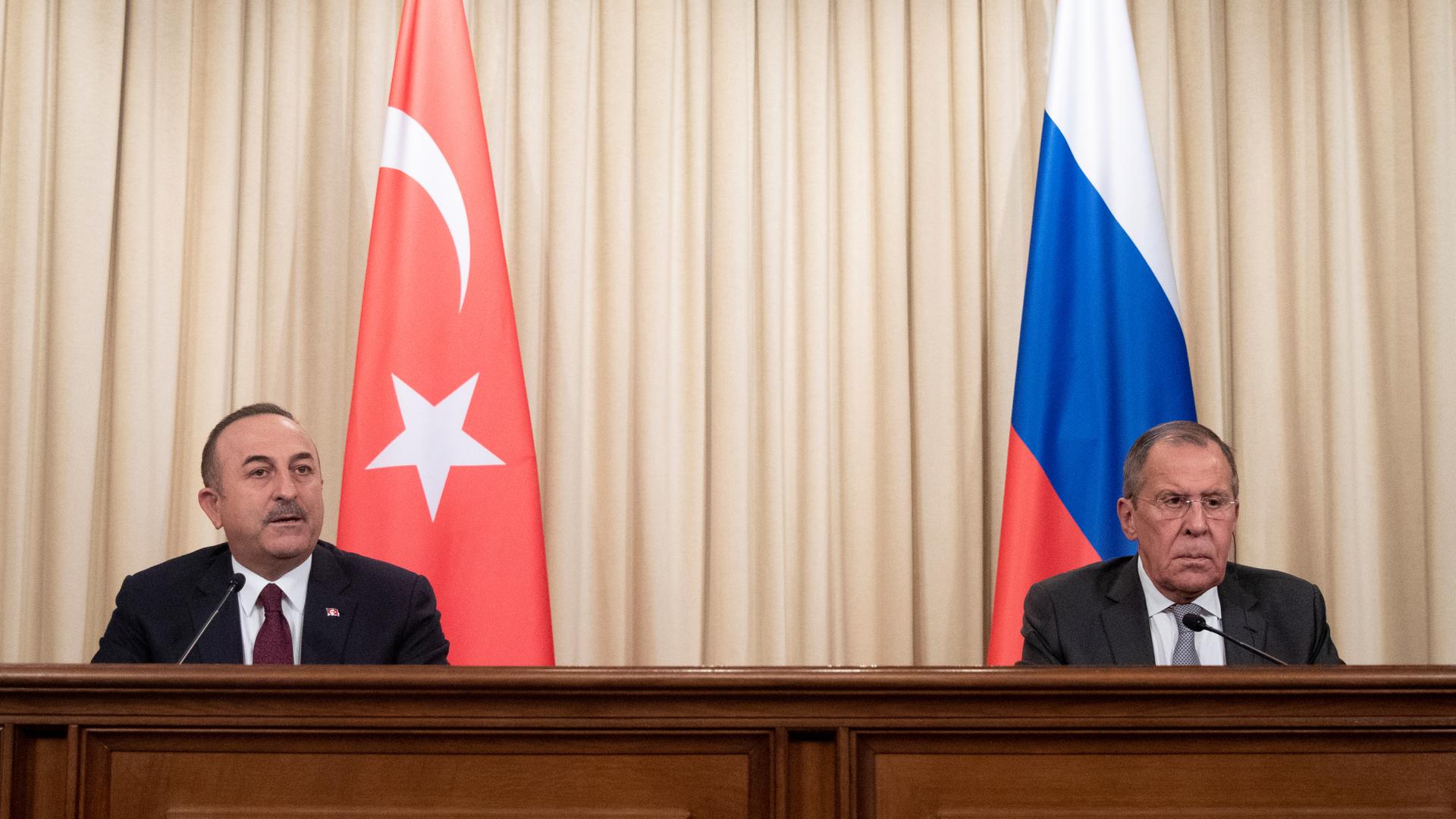Russian President Vladimir Putin has expressed support for Turkey’s participation in talks to resolve the dispute between Armenia and Azerbaijan over the Armenian occupation of Nagorno-Karabakh.
However, in the meantime, Russian jets bombarded an oil refinery in the Syrian border town of Jarablus and targeted a military parade by the Syrian National Army in Idlib, killing at least 50 Turkey-backed soldiers.
Both strikes were interpreted as a demonstration of Russian disapproval over Turkey’s role in the current war in Nagorno-Karabakh which Russia considers within its sphere of influence. So why did Russia invite Turkey to the table yet express its frustration through military escalation in Syria?
Over the years, Turkey and Russia have built and navigated a relationship where cooperation and conflict go hand in hand while both nations try to compartmentalise their complex relations.
The shooting down of a Russian fighter jet after Russia violated Turkey’s airspace in 2015 and the following freeze in Turkish-Russian relations was a lesson remembered until today.
After the incident, Turkey and Russia entered a spiral of escalation and increased the costs for each side. While Russia enabled several military victories for its client in Damascus, Turkey’s support to the Syrian opposition caused massive damage to Russia and its local allies.
Soon, both nations learned that they need to talk despite their disagreements and find areas of cooperation as buffers for a potential escalation in the relationship – otherwise, Turkey and Russia would bleed themselves out. This experience in Syria is now standardised across the gambit of Turkey-Russia relations.
Both nations are on opposing sides of the wars in Syria, Libya, and Nagorno-Karabakh. Russia still does not recognise the PKK as a terror group and provides military protection to its Syrian branch known as PYD/YPG.
However, both nations maintain a dialogue over Syria, Libya, and Nagorno-Karabakh. The Astana process and the constitutional committee, as well as the memorandums over Idlib and the YPG presence in Syria, are ways for both to de-escalate.
In reality, the conflicts can be seen as cautious arm wrestling in which both sides try to win, but also avoid disrupting relations entirely.
In Libya, Turkey and Russia have found an understanding to ease tensions. While Russian private military contractors are the main military bulk for the warlord Khalifa Haftar, Turkey is the biggest supporter of the Libyan government. Even though Russian mercenaries protect oil facilities on behalf of Haftar, new political agreements enabled a continuation of oil production in the country.
But this arrangement is not limited to only war-torn regions, but also in general geopolitics and energy politics, the same approach is visible. With the Russian illegal annexation of Crimea, Russia changed the dynamics in the Black Sea and expanded its claim on the maritime zone.
For Turkey, NATO’s southern flank, this is a historic geopolitical challenge. Since the annexation, Turkey increased its cooperation with Ukraine, formed joint defence companies, and signed several arms deals.
Turkey does underline that it does not recognise the Russian annexation of Crimea and maintains good relations with the representatives of the Crimean Tatars.
But still, this reality did not prevent Turkey and Russia from building the TurkStream in addition to the already working BlueStream. These crucial energy infrastructure projects function as a buffer in relations. On the contrary, the Russian occupation of Georgian territory is a direct threat to Turkish energy infrastructure with Azerbaijan and the Turkish link to Central Asia.
Other Turkish-Russian areas of cooperation like the building of the Akkuyu Nuclear Power Plant or the procurement of the S-400 air-defence systems by Turkey can be seen in the same light. Even though, both are viewed as a necessity rather than a choice, both function as tools of de-escalation.
For instance, on the same day as Turkey signed several critical defence agreements with Ukraine, Turkey tested the S-400 air-defence systems. Or to put it in another frame, the same Turkey whose drones have destroyed Russian air-defence systems in Syria, Libya, and Azerbaijan en masse, has not only purchased the most advanced Russian air-defence systems but also tested them despite American threats of sanctions.
Historically, the purchase of the S-400 might have occurred due to the rejection of Turkish demands to buy air-defence systems from its NATO partners, but whatever the reason was, they have an additional function of acting as a buffer in the relations.
From a Russian perspective, Turkey has evolved as its biggest competitor. Turkey stands in front of Russian expansionism in the Caucasus, the Black Sea, and the Middle East and Turkish foreign policy has not only challenged Russia in its expansionism but also interfered in regions regarded as Russia’s hinterland.
Furthermore, Turkey has annihilated any form of argument in favour of Russian deterrence. For example, the argument by the former US president Barack Obama that Russian air-defence systems in Syria would be a major threat in the case of American intervention is now seen as a complete failure of the Obama administration. Turkey has proven the abject weakness of some Russian-manufactured arms.
Still, Russia and Turkey maintain areas of cooperation which are of benefit for Russia as well. Therefore, the Russian side can’t risk another down in relations like the experience of 2015.
From the Turkish perspective, having experienced the indifference of Turkey’s NATO allies in the case of a direct escalation with Russia, preventing a collapse of the relations with Russia is crucial. Therefore, the geopolitical brinkmanship between both nations will continue, maybe even grow, but it will not likely evolve into direct animosity due to the buffers built into the relationship.
Disclaimer: The viewpoints expressed by the authors do not necessarily reflect the opinions, viewpoints and editorial policies of TRT World.
We welcome all pitches and submissions to TRT World Opinion – please send them via email, to [email protected]
Author: Omer Ozkizilcik @omerozkizilcik
Omer Ozkizilcik is an analyst for the SETA Foundation and is an editor at Suriye Gundemi.
Source










Discussion about this post